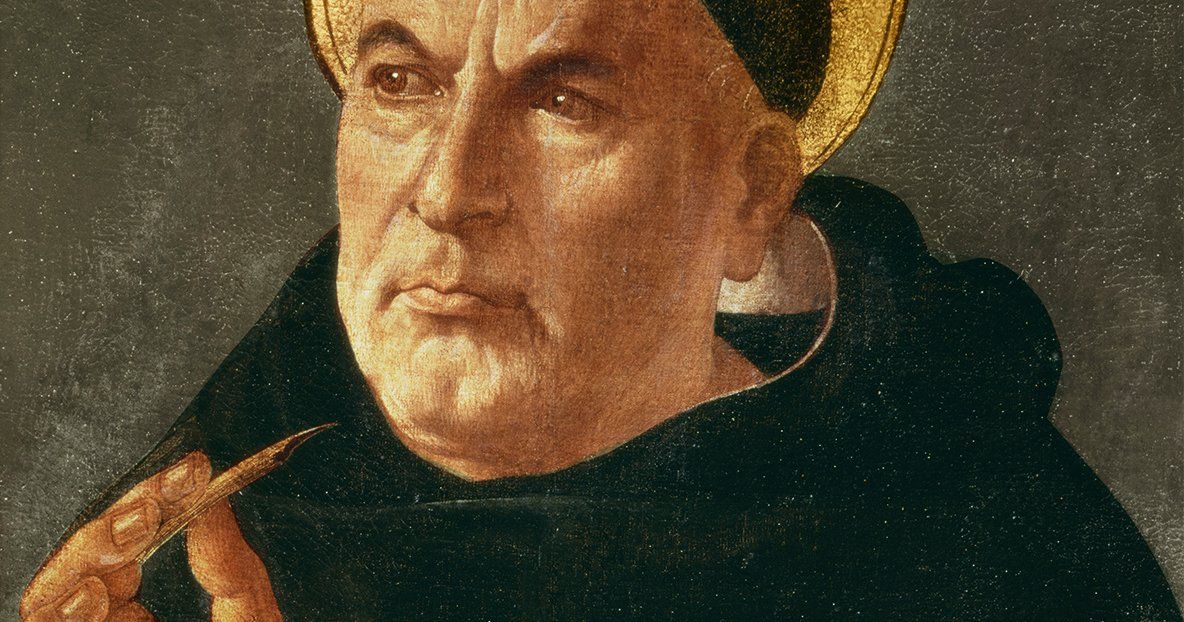Message of Abbot Paul - Friday 28th January

Message from Fr Paul for Friday, 28th January 2022
Today the Church keeps the feast of St Thomas Aquinas, the great Dominican philosopher and theologian, who went to school at Montecassino, where his uncle was abbot, and so received his early education with the Benedictines. It was expected that he might follow in his uncle’s footsteps, but God had other ideas for the man who became possibly the greatest Christian thinker and writer in the West. He accomplished a great deal considering he died in 1274 at the age of just 48. He studied at the University of Paris, then at Naples. It was against the will of his family that he joined the Dominicans and not without a struggle. He is known as the Doctor Angelicus, but most of us know him best as the author of the hymns and antiphons for the Mass and Office of Corpus Christi. He is undoubtedly one of the greatest thinkers the world has ever known. What more can we say? Let’s ask his intercession for the Church today and for the Synod. We also have his writings, thank God.
---
Our Gospel passage today continues our reading of Mark, (Mk 4: 26-34), with two further parables that use the image of a seed, to which Jesus compares the kingdom of heaven. To begin with Jesus says, speaking to the crowds, “This is what the kingdom of God is like. A man throws seed on the land. Night and day, while he sleeps, when he is awake, the seed is sprouting and growing; how, he does not know. Of its own accord the land produces first the shoot, then the ear, then the full grain in the ear. And when the crop is ready, he loses no time: he starts to reap because the harvest has come.” The kingdom of heaven, then, is like a seed, that begins life as something small and insignificant and yet grows in a mysterious way into a plant that produces fruit that can be harvested. Jesus says in a mysterious way to emphasise that this is God’s will and God’s doing. To begin with, the seed is hidden, so we do not see it grow, we have to trust that this is happening. We only have control over the quality of the soil and the amount of water given it, unless we rely entirely on the rainfall. The process is slow at the start, but speeds up as the plant grows and the fruit matures. The kingdom, says Jesus, is just like that.
Then we come to the Parable of the Mustard Seed, which emphasises how something really large grows out of something infinitely small. “What can we say the kingdom of God is like? What parable can we find for it? It is like a mustard seed which at the time of its sowing in the soil is the smallest of all the seeds on earth; yet once it is sown it grows into the biggest shrub of them all and puts out big branches so that the birds of the air can shelter in its shade.” We mustn’t forget that in these parables Jesus is speaking about the kingdom of heaven, which in this life is visible in the Church, the community of believers centred on Christ. At times we fret and worry that the Church appears to be imploding and that people are losing faith. Jesus tells us that the kingdom of God might appear to be small and insignificant, like a mustard seed, but it will grow to become like a tree, and that God has it in hand. The mission of the Church begins in a very small and humble way, but God has the power to make it grow and flourishing again. The same goes for our faith.
Finally, Mark tells us that, “Using many parables like these, he spoke the word to them, so far as they were capable of understanding it. He would not speak to them except in parables, but he explained everything to his disciples when they were alone.” It would be fascinating to know what the crowds made of the parables of Jesus, but what is really important now is what we make of them. Jesus meant them to help us grow in faith and hope, that we might experience God’s love and learn to love him more. Lord, may the power and light of your parables help us grow in faith and may they guide us into your kingdom. Amen.









